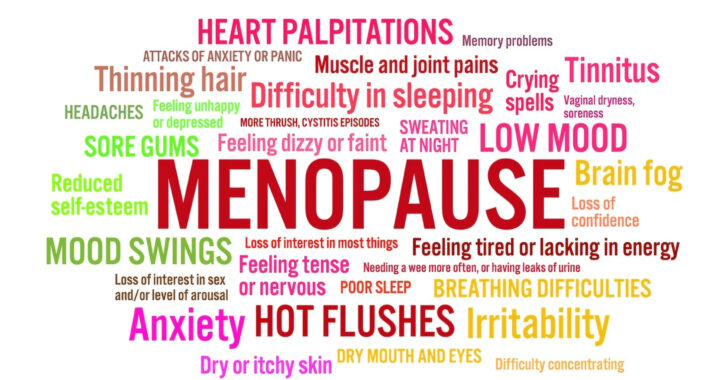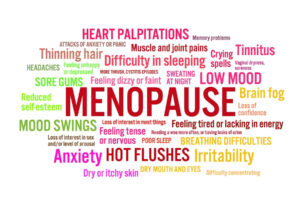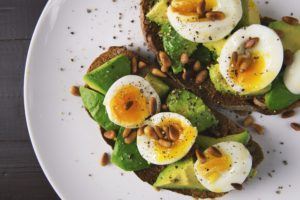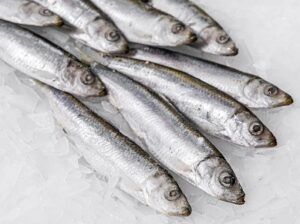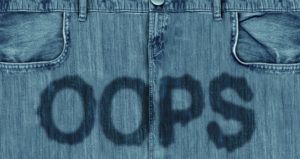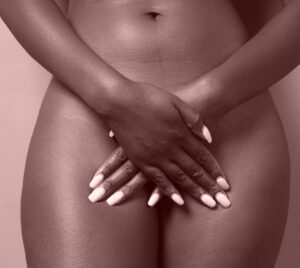You can watch the video of the event here
Kathy Abernethy – Menopause Specialist
Menopause Enthusiast
Kathy has spent over 30 years working in the field of menopause.
‘Menopause is a life transition that everyone with ovaries will go through’
What is menopause?
“Periods stop”
“Flushes/sweats”
“Health changes during your 50’s”
Whilst all that is true, strictly speaking, the only thing consistent for everyone is that periods will stop.
Some people may have symptoms but some people may not:
You may be 1 in 75% who get flushes and sweats
You may be 1 in 60% that get brain fog
You may be 1 in 25% that get symptoms so severe that they need to do something about it e.g. fan on desk, speak to line manager about changes at work, take control of air conditioning!!!
Good time to evaluate health. Menopause is a hump in the road that can be bumpy but you will come out the other side.
Average age in UK if you are white is around 51. If you are black or asian it is 47/48.
People present differently depending on their ethnicity, racial profile and individual symptoms
Menopause usually occurs between 45-55 and can still have periods during this time – perimenopause. Some people can have periods into their 60’s.
1% go through very early menopause under 40. This is an artificial menopause and requires different help and support. 1 in 1,000 go through menopause under 30
Symptoms
Flushes & Sweats
“Flushes & Sweats” – ¾ people
“Messing with my thermostat”
“Flashing up my skin. Feel unwell”
“Starts at chest or head – sometimes with palpitations”. 9/10 people experience menopause palpitations.
Menopause Glow
Go very red. Doesn’t always happen.
Brain Fog
Can’t catch the word, don’t recall people’s name, forget your point in a meeting
Mood
Up and down, Serotonin levels change, especially during perimenopause as oestrogen swings up and down.
Most people don’t get clinically depressed.
May feel low or moody sometimes
Vertigo/Balance
Palpitations
Restless legs
Itchy skin
Feels like insects crawling over skin.
Can break out in hives
Oestrogen receptors in skin changing
Sleep disturbance
Due to sweats during night
Wake early
Poor quality of sleep
More dreams
Could be due to poor quality of sleep/lack of sleep
Menopausal rage
Talked about more now
Irrational – not yourself
Sex drive
Can go down – desire and sexual response
Though also freedom from periods, PMS, contraception so may boost it
Dry Eyes
Headaches
Noise Intolerance
Stiff Joints
Especially in morning
Joints losing their lubrication
Exercise good for joints
Hair Loss
Thinning and quality is down to menopause
Loosing clumps of hair could be thyroid
How do you know menopause
A new change
Around peri/menopausal age range
Keep a journal and track symptoms to spot trends
Changes to periods
Does it last for ever?
Some people will last for a few months – 2 years
Some it will last 5-7 years
Some may last longer
Some may not experience any symptoms
Positives
No more periods or PMT
May feel more confident, settled…time to take charge of health and decide how want to spend the rest of your life
Treatments
Be prepared!
Look after health now – both physically and emotionally. Manage stress levels.
HRT – for symptom relief – Low risk medical treatment that helps reduce symptoms.
Natural alternatives – diet, lifestyle, exercise
HRT not answer on own. Needs to be done in conjunction with diet, lifestyle and exercise as well. Example of this is Davina Mcall. People think the reason she looks the way she does is down to HRT. It isn’t. She does take HRT but also exercises 5 times a week and avoids sugar and alcohol.
Jackie Lynch – Nutritionist
No quick fix
Get basics right
Eggs
Great source of protein (Other sources include meat, fish, vegetables)
Women generally don’t get enough protein versus men. Women often eat something like toast for breakfast, green salad for lunch (as on diet!!) and finally have something like chicken in evening. We need protein with every meal & snack
- Helps balance your blood sugar – nutrition 101. Every time your blood sugar crashes body releases stress hormones (adrenaline and cortisol) which can make menopause symptoms worse.
- Slows release of carbs in body as hard to digest
- Every cell in body made of protein – good for growth & repair of cells
- Bones made of protein.
- Can loose up to 40% muscle mass after menopause
Are you giving your body enough protein? If not, going to prioritise vital organs and send protein to heart, liver and lungs to keep you alive. It won’t care that your hair is thinning and nails are brittle!!!
Eggs are a superfood (better than blueberries!!)
Don’t just have egg white omelete (life too short). Yolks are full of goodness:
- B Vitamins
- Selenium
- Iodine
- Omega 3
- Iron
Does have little bit of cholesterol but don’t let anyone tell you can’t have an egg a day!!
Baby Spinach
Leafy green veg one stop shop for menopause friendly nutrients
Great source of magnesium – menopausal womans’ best friend as does lots of important jobs:
- Calms nervous system
- Regulates body reaction to stress – helping you to respond to life daily challenges
- Regulates muscle function – tired aching muscles/twitchy eyelid symptom of magnesium deficiency
Peristalsis – contraction and relaxation of bowel muscle, pushing stool through. If have sluggish bowel need more green leafy veg.
Feeling tierd/jittery – low magnesium
Couple of handfuls of green leafy veg per day
Epsom salts in bath before bed – help calm down
Magnesium great for helping get good nights sleep
Red Pepper
3 x more Vitamin C per 100g than Orange
Anti-Oxidant – keeps immune system in good shape
During menopause, body uses vitamin c to make collagen
– Skin plump/elastic
– Vaginal tissues
– Bones Flexible – if fall over helps you bounce
Up vitamin c by eating 5 different veg every day. Better source than collagen supplements (often in a form not recognised by the body)
Sardines
5 x more calcium (soft bones)
Rich source of Omega 3 (great for heart)
Eat oily fish 3 x week – mackerel, salmon, sardines
Good for brain, nervous system & hormone balance
Makes hair look super shiny too!
Ground Flax Seeds
Phytoestrogens: Plant compounds that mimic action of oestrogen in the body
Help to reduce hot flushes
Good source of Omega 3
Sprinkle on smoothies, yoghurt, porridge
Full Fat Yoghurt
Macro nutrient
Fat is our friend, need fat in diet
Even need saturated – body uses it to make sex hormones
It is excess of carbs that create fatty deposits and lead to being overweight

Super food
Sulfar compounds – detox and process of hormones in liver
Eat 3 x week
Vitamin D Supplement
Good brand Better You
Need Vit D to absorb calcium
Only small qties in foods
We produce Vitamin D when we are exposed to sunlight but suncream creates barrier and affects bodies ability to process UV rays and make Vitamin D
Good for mood & mental health, particularly as nights draw in
Everyone should take Vitamin D
Muscle
Exercise is really important during menopause. You may be on HRT, getting lots of sleep and eating a balanced diet but still need to exercise. Strength training very good for building muscle.
Muscle is a menopausal womans’ best friend
It is good:
Metabolically
To reduce cancer risk
Boost mental health
POWER THE PAUSE
Helps harness your hormones
“I want women in their 70’s to have proper bum in their trousers”
Incontinence
30 out of 60 women in the room tonight will leak urine
Often when they sneeze or cough
Some won’t make it to the toilet..”key in door moment”
Can be treated!!!!
Pelvic health training is monotonous but has highest level of medical evidence that it works over other forms of treatment/medication.
Simple exercizes
Most women find their pelvic floor via back passage – try stop a fart.
Gentle breathe in
Breathe out & hold. Control wind.
Release just as important as contraction.
Before cough or sneeze pre-contract the pelvic floor “the knack” – not leaking
Urinary Stress Incontinence
Can be treated by pelvic floor muscle strengthening or see PH specialists
Bladder unstable
Avoid “just in cases”
Don’t rush to the toilet
Your bladder like an untrained puppy – you’re in charge! You tell your puppy what to do!
Practice distraction technique – if you are having a key in door moment, do mental math to distract yourself
Topical Oestrogen
Bladder, vaginal tissue needs more oestrogen than any other tissue. Even on top of HRT use topical oestrogen.
Safe, localised, very effective – nearly all need it for rest of life
Sex
Intimacy – use lots of lube and talk to your partner
May lose natural pH during menopause – easy to get bacterial infection – use lube like Sylk pH that matches vaginal environment (3.8-4.5)
Bowel
Oestrogen also affects rectum & bowel
Daily happy perfect poo
Perfect poo is number 4 on chart – shape of torpedo, soft banana
Good poo position
Rectum kinks – want it straight for nice, smooth poo
Knees higher than hips
Slightly lean forward
Say MOO to POO
Direct backwards
Any bowel issues go to GP
Prolapses
About 50% will have changes to pelvic organ position. Most prolapses easy to sort. Don’t suffer in silence.
Power the Pause
Lean muscle mass
Proper bum in trousers
